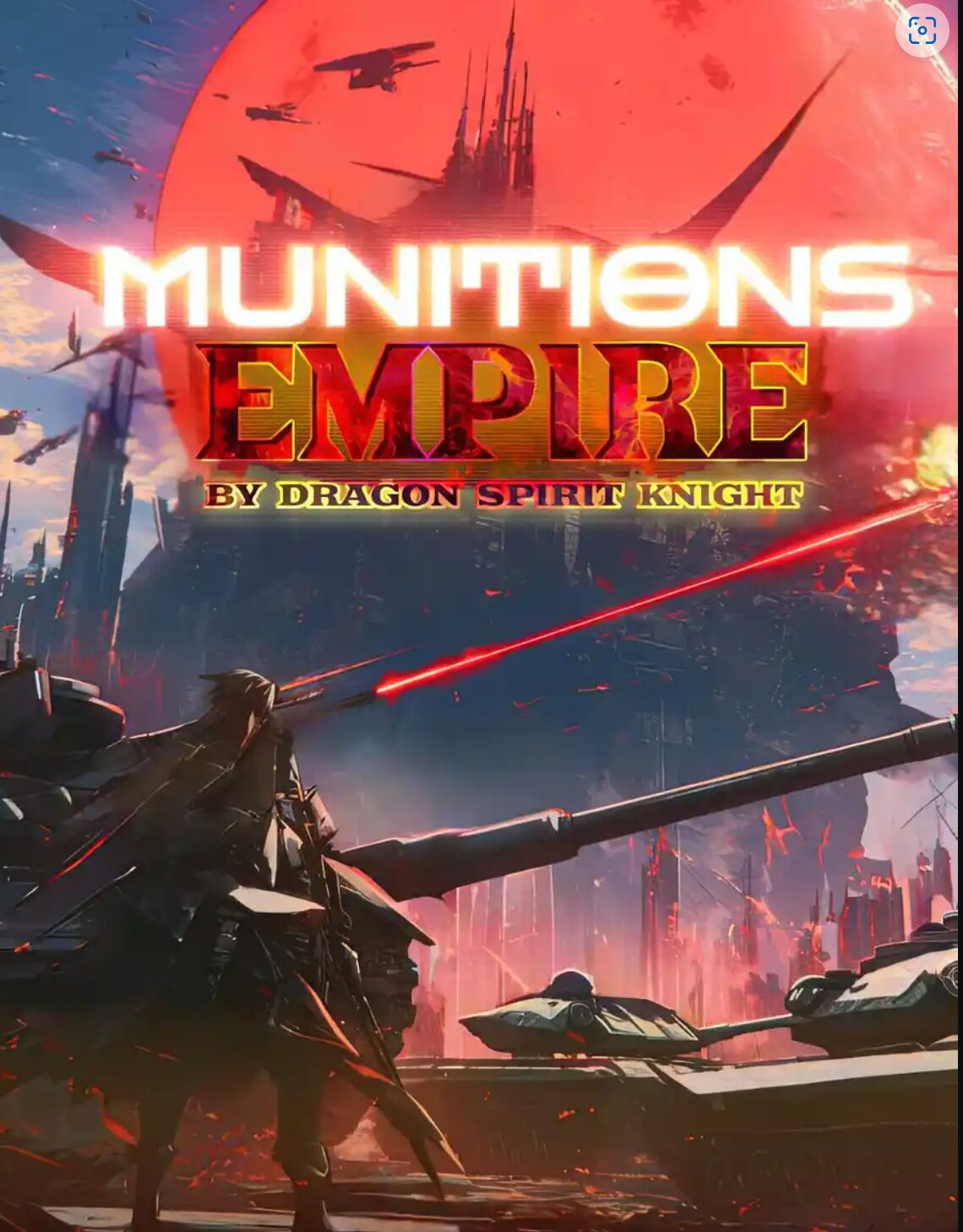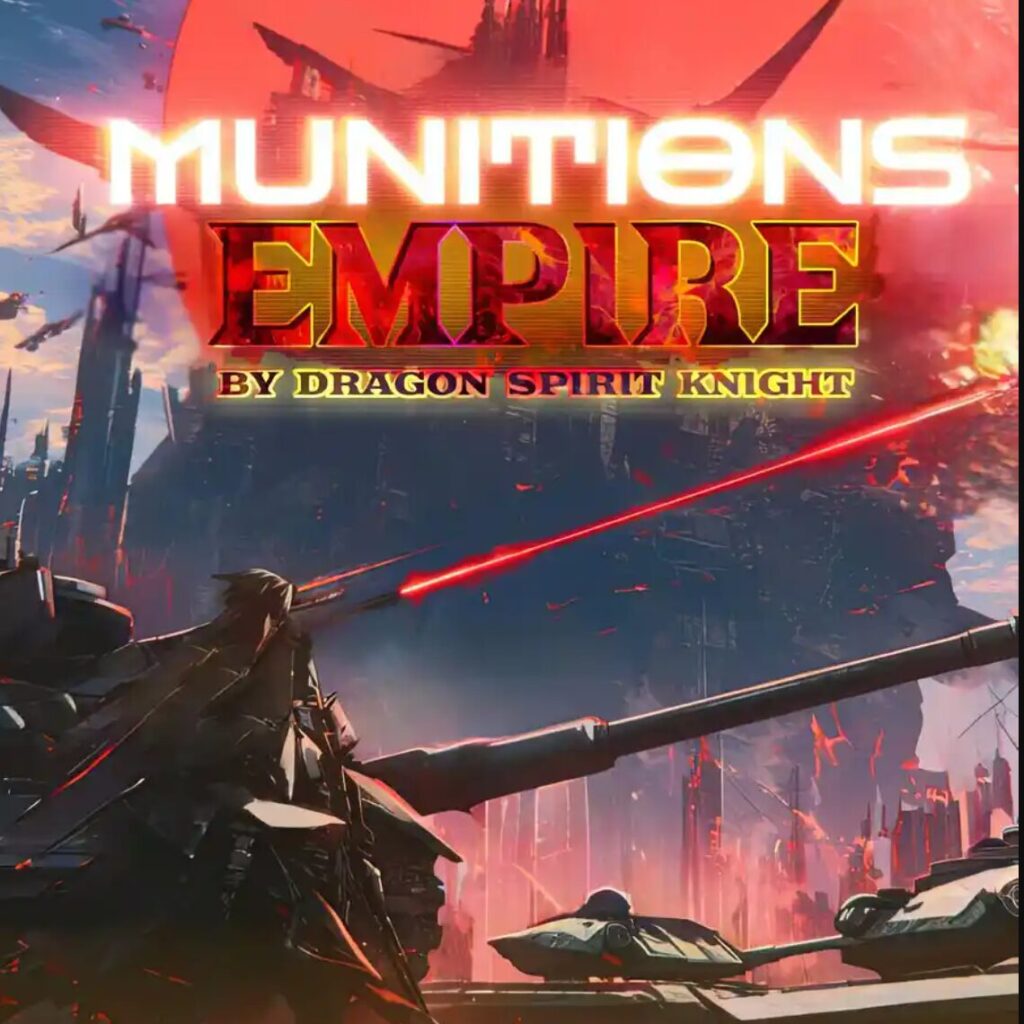Introduction

“Munitions Empire” presents a gripping narrative set in a parallel world that mirrors the early 20th century, infused with elements of fantasy and advanced technology. The story follows Raymond, a brilliant inventor who uses his knowledge from a previous life to revolutionize warfare. As he navigates this complex and often dangerous environment, Raymond’s journey is marked by ambition, moral dilemmas, and the pursuit of power. The tale is not just about building an empire; it delves into the ethical implications of technological advancements and the intricate relationships that shape leadership and influence.
Main Characters
Raymond, the protagonist, is at the heart of this compelling story. His character embodies the archetype of the visionary innovator—intelligent, resourceful, and deeply ambitious. Raymond’s backstory is pivotal; having lived in a modern world filled with technological marvels, he possesses knowledge that far exceeds that of his contemporaries. This unique perspective fuels his ambition to create an arms empire that will not only secure his legacy but also reshape the geopolitical landscape of his new world.

Raymond’s motivations are multifaceted. On one hand, he seeks personal recognition and power; on the other, he grapples with the moral implications of the weapons he creates. Throughout the story, readers witness his internal conflicts as he balances the desire for innovation with the potential consequences of his actions. His character development is profound, transforming from a solitary inventor into a leader who must confront the ethical dimensions of his empire-building.
Supporting Raymond is Clara, a skilled strategist whose intelligence and insight are vital to his success. Clara’s background and motivations add depth to the narrative. She is not just a strategist; she embodies the complexities of loyalty and ambition. Her relationship with Raymond is intricate, filled with mutual respect but also the potential for conflict as their goals sometimes diverge. Clara’s role emphasizes the importance of collaboration in leadership, showcasing how diverse perspectives can enhance strategic planning.
Another significant character is Marcus, a seasoned soldier whose experience in combat provides a grounding balance to Raymond’s innovative approaches. Marcus represents the practical side of warfare, contrasting with Raymond’s theoretical and technological focus. His motivations stem from a desire to protect his homeland and his comrades, making him a critical ally. The dynamics between Raymond, Clara, and Marcus form a rich tapestry of relationships that highlight the complexities of teamwork in the pursuit of ambition.
Plot
The plot of “Munitions Empire” is driven by Raymond’s ambition to establish a powerful munitions empire amidst a backdrop of war and political intrigue. From the outset, the stakes are high, as various factions vie for power and control. Raymond’s journey begins with the recognition that to build his empire, he must create advanced weaponry that can outmatch his rivals.
Early in the narrative, Raymond identifies the necessity for allies and resources, prompting him to forge crucial partnerships with various factions. This process of alliance-building is fraught with challenges, as not all factions are willing to cooperate. Political intrigue and manipulation play significant roles, forcing Raymond to navigate a treacherous landscape filled with deception and betrayal.
As the story progresses, significant events propel the plot forward. Raymond’s first major breakthrough comes when he develops a new type of weapon that significantly enhances combat effectiveness. This innovation not only solidifies his reputation but also attracts the attention of both allies and enemies. His ability to innovate quickly becomes a double-edged sword; while it garners respect, it also incites jealousy and hostility among rival factions.
Tensions escalate as rival factions launch attacks against Raymond’s burgeoning empire. These confrontations are not merely physical battles but also ideological clashes, with different factions representing varying philosophies of governance and power. Raymond must adapt quickly, employing both his strategic acumen and his advanced technology to outmaneuver his opponents.
A pivotal turning point occurs when Raymond successfully defends his territory from a coordinated assault by multiple rival factions. This victory is not just a testament to his leadership; it marks a significant moment in his character development. He begins to realize that with great power comes great responsibility. The aftermath of the battle forces him to confront the consequences of his actions, prompting introspection about the ethical implications of the weapons he produces.
The climax of the story is a dramatic confrontation with a powerful adversary, a rival king determined to thwart Raymond’s ambitions at all costs. This final showdown tests not only Raymond’s strategic capabilities but also the strength of the relationships he has built. The stakes are raised to their highest level, and the outcome will determine the future of his empire.
As the conflict reaches its zenith, Raymond’s ingenuity and leadership skills are pushed to the limit. He must rely on the strengths of his allies, including Clara’s strategic mind and Marcus’s combat experience, to secure a decisive victory. The resolution of this conflict serves as a powerful commentary on the themes of ambition, loyalty, and the ethical responsibilities of leadership.
Setting
The setting of “Munitions Empire” is richly crafted, combining industrial revolution aesthetics with elements of fantasy. The world is marked by its diverse landscapes, from bustling cities teeming with innovation to treacherous battlefields where the consequences of warfare are starkly visible. This vibrant backdrop enhances the narrative, providing a dynamic stage for the characters’ journeys.
Key locations include Raymond’s headquarters, a sprawling factory where groundbreaking weaponry is developed. This location symbolizes both innovation and the ethical dilemmas that arise from technological advancement. The factory serves as a hub of creativity and collaboration but also as a reminder of the destructive potential of the inventions being produced.
Another important setting is the various battlefield locations where Raymond and his allies face off against rival factions. These scenes are vividly depicted, immersing readers in the chaos and intensity of warfare. The contrast between the idyllic vision Raymond has for his empire and the harsh realities of combat heightens the emotional stakes of the story.
The socio-political landscape of the world is characterized by a struggle for power among different factions. Each faction has its own culture, politics, and ambitions, creating a rich tapestry of conflicts and alliances. This environment influences the characters’ decisions and actions, adding depth to the narrative. The setting serves not only as a backdrop but as a catalyst for the characters’ growth and development.
Themes
Several themes resonate throughout “Munitions Empire,” each intricately woven into the fabric of the narrative. One of the most prominent themes is ambition and its consequences. Raymond’s drive to build a powerful empire highlights the complexities of ambition, illustrating how the pursuit of power can lead to both great achievements and significant moral dilemmas.
The theme of ethics in warfare is equally significant. The story prompts readers to consider the moral implications of technological advancements in combat. As Raymond grapples with the consequences of his inventions, the narrative raises questions about the cost of innovation and the impact of weaponry on society. This exploration of ethics encourages readers to reflect on the responsibilities that come with power and the potential for destruction inherent in technological progress.
Another essential theme is the importance of teamwork and collaboration. Throughout the story, Raymond’s success is not solely due to his individual genius; it is also a product of the diverse skills and perspectives of his allies. The relationships between Raymond, Clara, and Marcus exemplify how trust, loyalty, and collaboration can lead to greater achievements. This theme underscores the idea that true leadership involves recognizing the strengths of others and fostering a spirit of cooperation.
The narrative also explores the complexity of human relationships in the pursuit of ambition. Characters navigate a web of loyalty, betrayal, and moral conflict, reflecting the intricacies of their motivations. The interplay between personal goals and the greater good serves as a reminder that ambition must be balanced with ethical considerations.
Author’s Narrative Style
The author’s narrative style is characterized by vivid and descriptive prose that immerses readers in the world of “Munitions Empire.” The tone is engaging and dynamic, effectively balancing moments of intense action with introspective passages that provide insight into the characters’ thoughts and feelings. This approach creates a multi-layered reading experience that captivates the audience.
Dialogue is crafted with authenticity, revealing character motivations and driving the plot forward. The interactions between characters are rich and nuanced, showcasing their complexities and the dynamics of their relationships. The balance between action and character development ensures that the story remains both entertaining and thought-provoking.
The narrative also employs various literary techniques to enhance the storytelling. Foreshadowing is used effectively to build tension and anticipation, while flashbacks provide context for characters’ motivations. This layered approach enriches the narrative, allowing readers to engage with the story on multiple levels.
Author’s Point of View
The story is told from a third-person perspective, allowing for a broader view of the characters’ inner thoughts and motivations while maintaining an objective tone. This point of view facilitates an understanding of multiple characters, enriching the emotional depth of the narrative. The omniscient narrator provides insights into the thoughts and feelings of various characters, enhancing the reader’s connection to their journeys.
This narrative technique creates a layered story that highlights the complexity of human emotions and the interconnectedness of the characters’ arcs. Readers can appreciate the nuances of each character’s journey while maintaining a cohesive overall narrative.
Personal Reflection
“Munitions Empire” resonates with contemporary themes of ambition, innovation, and the ethical implications of technology. Raymond’s journey reflects the struggles many face in pursuit of power and recognition, making his story relevant and relatable. The exploration of moral dilemmas prompts readers to reflect on the consequences of technological advancements in today’s world, emphasizing the need for responsibility in innovation.
The narrative’s focus on teamwork and collaboration speaks to current societal dynamics, reminding us that collective efforts can lead to significant achievements. This engaging tale serves not only as an adventure but also as a reflection on the complexities of leadership and the impact of technology on society.
The story also invites readers to consider the broader implications of warfare and the role of technology in shaping conflicts. As Raymond navigates the challenges of building his empire, the narrative raises important questions about the responsibilities that come with power and the potential for destruction inherent in technological progress.
Conclusion
In conclusion, “Munitions Empire” is a richly woven narrative of character development, intricate plotting, and profound themes. The story captivates readers while encouraging them to reflect on their own journeys of growth and responsibility. Through its compelling characters and conflicts, the narrative delivers a timeless message about the power of ambition, the ethical challenges of innovation, and the importance of collaboration in achieving one’s goals. This engaging tale leaves a lasting impression, reminding us of the responsibilities that come with power and the impact of our choices on the world around us.


